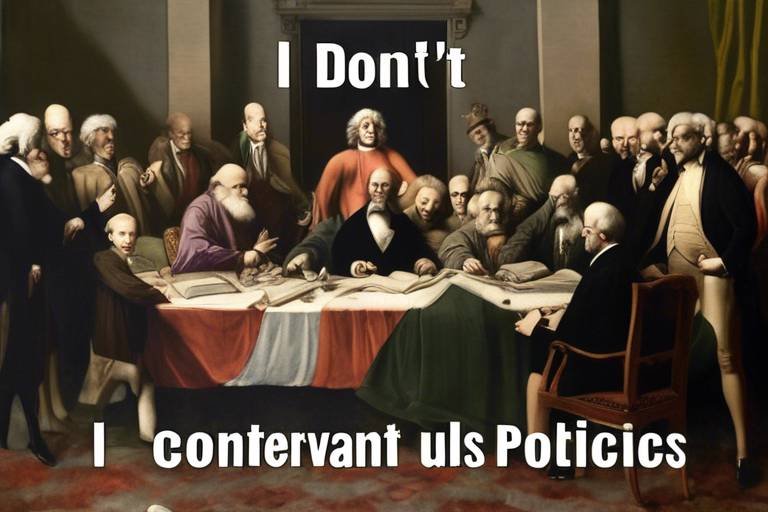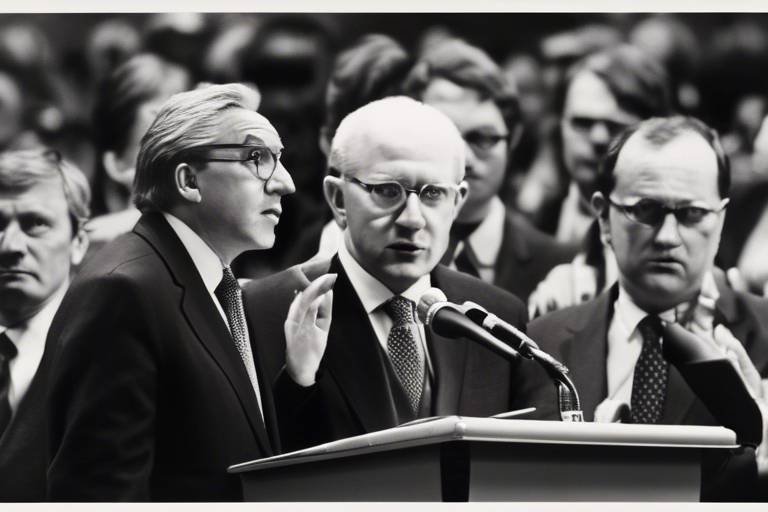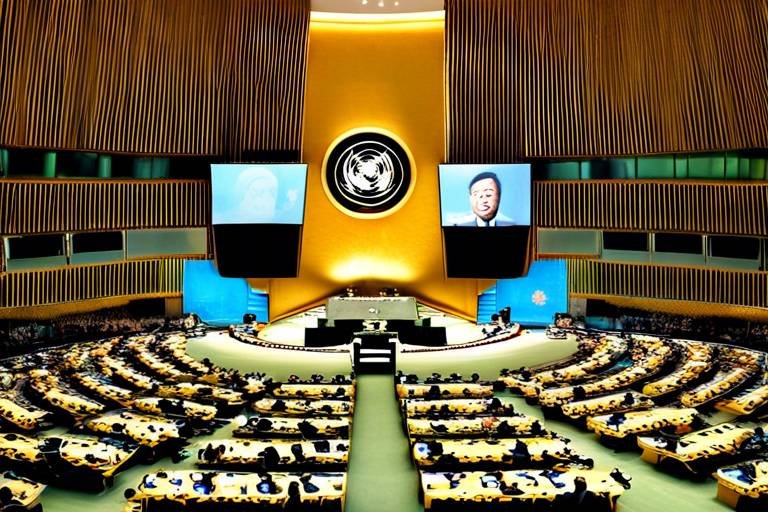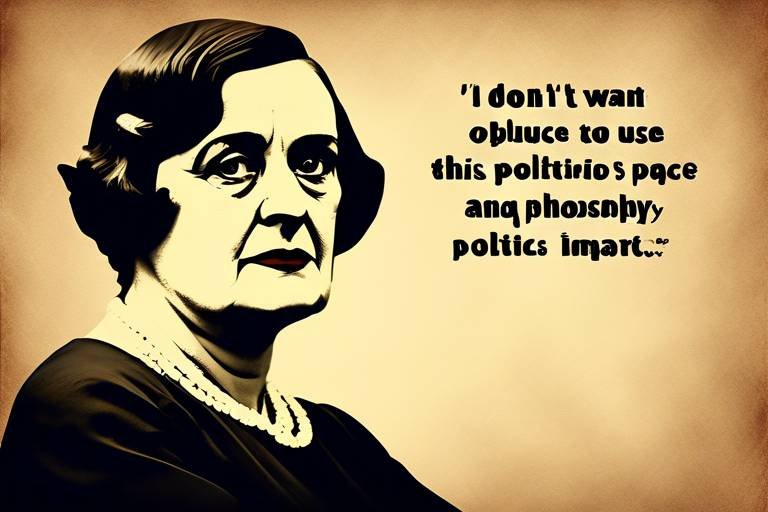The Philosophy of Secularism and its Political Impact
Secularism is a concept that resonates deeply in our modern world, acting as a beacon for societies striving for freedom and equality. At its core, secularism advocates for the separation of religion from political, social, and educational institutions. This principle not only fosters a sense of neutrality in governance but also ensures that individuals can practice their beliefs without interference from the state. Imagine a world where laws are made based on reason and collective welfare rather than religious dogma—this is the essence of secularism.
The philosophical underpinnings of secularism are rich and diverse, drawing from various schools of thought that emphasize rational inquiry and human rights. Historically, secularism emerged as a response to the dominance of religious institutions in public life, advocating for a society where governance is conducted through rational discourse rather than divine authority. This shift has had profound implications for political structures worldwide, influencing everything from the drafting of constitutions to the establishment of human rights laws.
As we delve deeper into the historical context of secularism, we uncover its evolution and the pivotal moments that shaped its trajectory. The Enlightenment period stands out as a significant era that championed reason, science, and individualism, laying the groundwork for modern secular thought. Thinkers like John Locke and Voltaire questioned the status quo, challenging the intertwining of church and state and advocating for a more enlightened approach to governance.
In contemporary politics, secularism continues to play a crucial role, often acting as a safeguard for democratic values. It promotes a political landscape where policies are made based on collective benefit rather than religious considerations, thereby supporting a more inclusive society. Yet, it's essential to recognize that secularism is not without its challenges. Various political and religious movements around the globe question its relevance, leading to debates about the role of religion in public life.
In summary, the philosophy of secularism is not just a theoretical construct; it is a vital framework that influences political systems, societal norms, and individual freedoms. As we navigate through the complexities of modern governance, understanding secularism's impact becomes increasingly important. It serves as a reminder that a society can thrive when it embraces diversity and upholds the rights of all its members, irrespective of their beliefs.
- What is secularism? Secularism is the principle of separating religion from political, social, and educational institutions.
- Why is secularism important? It promotes equality, freedom, and rational governance, ensuring that laws and policies are made without religious influence.
- How has secularism evolved over time? Secularism has evolved through historical events, particularly during the Enlightenment, where thinkers challenged the intertwining of religion and state.
- What challenges does secularism face today? Secularism faces challenges from various political and religious movements that question its relevance and push for religious influence in governance.

Defining Secularism
Secularism is a concept that resonates deeply in the fabric of modern society. At its core, secularism advocates for the separation of religion from political, social, and educational institutions. This principle is not merely about the absence of religion in public life; rather, it promotes a framework where individuals can coexist regardless of their religious beliefs. Imagine a bustling marketplace where people from different backgrounds come together, each with their own beliefs, yet united by a common purpose—this is the essence of secularism.
Historically, secularism emerged as a response to the intertwining of religious authority and governance, which often led to conflict and oppression. The idea is that the state should be neutral in matters of religion, allowing individuals the freedom to practice their faith—or to choose not to practice at all. This separation is crucial for fostering a society that values diversity and inclusivity.
To better understand secularism, we can break down its core tenets:
- Religious Freedom: Individuals should have the right to believe or not believe without coercion.
- Equality: All citizens, regardless of their religious affiliations, should be treated equally under the law.
- Neutrality of the State: The government should not favor or discriminate against any religion.
- Public Reason: Policies should be based on rational discourse rather than religious doctrine.
These principles are not just theoretical; they have profound implications for governance and social cohesion. In secular societies, laws are crafted based on common human rights rather than specific religious texts, ensuring that all individuals can participate in the democratic process. This approach not only protects the rights of minorities but also enriches the cultural tapestry of society.
In conclusion, secularism is more than a political ideology; it is a commitment to fostering a society where freedom of thought and expression reign supreme. By advocating for the separation of religion and state, secularism paves the way for a more just and equitable world, allowing individuals to thrive without the constraints of religious dogma. As we navigate the complexities of our diverse world, understanding and embracing secularism could be the key to building bridges between differing beliefs and cultures.

The Historical Context of Secularism
Understanding the origins of secularism is crucial for grasping its contemporary significance. The roots of secular thought can be traced back to ancient civilizations, where the interplay between religion and governance began to take shape. In many societies, religious authorities held significant power, often intertwining with political structures. However, as time progressed, the need for a clear distinction between religion and state became increasingly evident. The transition from a theocratic governance model to a more secular approach reflects humanity's ongoing quest for freedom and equality.
One of the pivotal moments in this evolution was the Renaissance, a period marked by a revival of classical learning and a shift towards humanism. This intellectual movement encouraged individuals to seek knowledge through reason rather than through religious dogma. As a result, secularism began to gain traction, challenging the long-standing dominance of religious institutions in societal matters.
As we dive deeper into history, we cannot overlook the impact of the Reformation in the 16th century. This movement not only questioned the authority of the Catholic Church but also laid the groundwork for religious pluralism. Figures like Martin Luther and John Calvin advocated for personal interpretation of the scriptures, which further diluted the power of centralized religious authority. This shift was crucial in promoting the idea that governance could exist independently of religious influence.
By the time we reached the Enlightenment in the 17th and 18th centuries, secularism was ready to take center stage. Enlightenment thinkers such as John Locke and Voltaire began to articulate ideas that would challenge the very foundations of religious authority. They argued for the separation of church and state, emphasizing the importance of reason, individual rights, and freedom of thought. These ideas were revolutionary, setting the stage for modern secular states.
In the following table, we can see key historical events that contributed to the rise of secularism:
| Event | Year | Significance |
|---|---|---|
| Renaissance | 14th - 17th Century | Revival of classical learning and humanism. |
| Reformation | 16th Century | Questioned the authority of the Catholic Church, promoting religious pluralism. |
| Enlightenment | 17th - 18th Century | Advocated for reason, individual rights, and the separation of church and state. |
The culmination of these historical movements led to the formation of secular states in the 19th and 20th centuries, where governance was increasingly based on rationality and human rights rather than religious doctrine. Countries began to adopt constitutions that enshrined religious freedom and the separation of religion from state affairs. This marked a significant turning point in the way societies operated, allowing for greater equality and a more inclusive political landscape.
In summary, the historical context of secularism is rich and complex, shaped by various intellectual movements and pivotal events. It represents humanity's ongoing struggle for freedom, equality, and rational governance, standing as a testament to the power of ideas in transforming societies.
- What is secularism? Secularism is the principle of separating religion from political, social, and educational institutions.
- How did secularism evolve historically? Secularism evolved through various historical events, including the Renaissance, Reformation, and Enlightenment, which challenged the authority of religious institutions.
- What are the benefits of secularism? Secularism promotes equality, freedom of thought, and human rights, allowing diverse beliefs to coexist in society.

Enlightenment Thinkers and Secularism
The Enlightenment period, often referred to as the Age of Reason, was a transformative era that laid the groundwork for modern secularism. It's fascinating how a movement that began in the late 17th century has rippled through time, influencing our political, social, and philosophical landscapes. Thinkers of this period challenged traditional authority, particularly that of the Church, advocating for reason and individualism. This shift was not merely a philosophical exercise; it was a profound rethinking of the relationship between religion and governance.
Among the luminaries of this era, several thinkers stand out for their contributions to secular thought. Figures like John Locke and Voltaire played pivotal roles in promoting ideas that would challenge the status quo. Locke's advocacy for religious tolerance and the separation of church and state was revolutionary. He argued that governments should not impose religious beliefs on individuals, a notion that resonates strongly in contemporary discussions about religious freedom. His famous assertion that "the care of souls cannot belong to the civil magistrate" encapsulates this principle beautifully.
On the other hand, Voltaire, with his sharp wit and relentless critique of religious institutions, pushed the boundaries even further. He famously declared, "Écrasez l'infâme" (Crush the infamous thing), referring to the abuses of power by the Church. Voltaire's writings not only questioned the moral authority of religious institutions but also highlighted the dangers of dogma and superstition. His call for reason over blind faith was a clarion call for secular governance, emphasizing that a society based on reason would lead to greater justice and equality.
This philosophical shift was not without its challenges. The Enlightenment thinkers faced significant backlash from religious authorities. Yet, their ideas began to take root, influencing revolutions and reforms across Europe and beyond. The rise of secular states can be traced back to these foundational thoughts. As societies began to embrace secularism, they sought to create political systems that prioritized human rights and individual freedoms over religious dictates.
In summary, the Enlightenment thinkers were instrumental in shaping the principles of secularism. Their advocacy for reason, tolerance, and individual rights has had a lasting impact on modern political structures. As we navigate the complexities of contemporary governance, their ideas continue to serve as a guiding light, reminding us of the importance of separating religious influence from political authority.
- What is secularism?
Secularism is the principle of separating religion from political, social, and educational institutions, promoting a society where individuals can practice their beliefs freely without state interference.
- How did Enlightenment thinkers influence secularism?
Enlightenment thinkers like John Locke and Voltaire challenged traditional religious authority, advocating for reason, tolerance, and the separation of church and state, which laid the groundwork for modern secularism.
- Why is secularism important in contemporary politics?
Secularism is crucial as it supports human rights, promotes equality, and ensures that governmental policies are made based on reason rather than religious beliefs, fostering a more inclusive society.
- What challenges does secularism face today?
Secularism faces challenges such as religious extremism, political movements that seek to intertwine religion with governance, and societal pressures that favor religious ideologies over secular principles.

John Locke's Contributions
John Locke, often hailed as the father of liberalism, made significant contributions to the philosophy of secularism that resonate even today. His ideas were revolutionary for the time, advocating for a society where religion and government could coexist without one infringing on the other. Locke's most notable work, "A Letter Concerning Toleration," published in 1689, argued vehemently for the concept of religious tolerance. He believed that the state should not impose religious beliefs on its citizens, which laid the groundwork for the separation of church and state.
Locke's philosophy posited that individuals possess natural rights that are inherent and cannot be surrendered or taken away. He famously outlined these rights as life, liberty, and property. In the context of secularism, this was groundbreaking because it framed the protection of individual rights as a responsibility of the government, rather than a privilege bestowed by religious authority. By advocating that governance should be based on reason and consent rather than divine right, Locke shifted the focus from religious dogma to human rationality and ethics.
Furthermore, Locke's views on governance were deeply intertwined with his thoughts on secularism. He argued for a government that is accountable to the people, which inherently requires a secular approach to policy-making. This means that laws and governance should be based on rational discourse and collective agreement, rather than on religious mandates. In Locke's vision, a secular government ensures that all individuals, regardless of their faith, have equal rights and protections under the law.
Locke's influence extended beyond just political theory; it also impacted the development of human rights. By championing the idea that everyone is entitled to freedom of conscience, he laid the foundation for modern human rights discourse. His insistence that civil governance should not interfere with personal beliefs is a principle that many contemporary democracies strive to uphold.
To illustrate Locke's contributions more clearly, consider the following table that summarizes his key principles:
| Principle | Description |
|---|---|
| Religious Tolerance | Advocated for the separation of religion from state affairs, allowing individuals to practice their faith freely. |
| Natural Rights | Proposed that individuals have inherent rights to life, liberty, and property that must be protected by the government. |
| Consent of the Governed | Emphasized that legitimate government authority comes from the consent of the people, not divine mandate. |
| Secular Governance | Argued for a rational and ethical basis for laws, independent of religious doctrine. |
In summary, John Locke's contributions to secular thought were pivotal in shaping modern political philosophy. His emphasis on individual rights, religious tolerance, and the necessity of a government accountable to its citizens has influenced countless democratic societies around the globe. His legacy endures, reminding us that a secular approach to governance is not just beneficial, but essential for the flourishing of diverse societies.
- What is secularism? Secularism is the principle of separating religion from political, social, and educational institutions.
- How did John Locke influence secularism? Locke advocated for religious tolerance and the protection of natural rights, laying the groundwork for modern secular governance.
- Why is secularism important in contemporary politics? Secularism promotes equality and freedom by ensuring that laws and governance are based on reason rather than religious doctrines.
- What challenges does secularism face today? Secularism encounters challenges from religious extremism, political ideologies, and cultural resistance in various parts of the world.

Voltaire and Critiques of Religion
Voltaire, a towering figure of the Enlightenment, wielded his pen like a sword against the dogmas and superstitions of religion. His critiques were not merely personal attacks; they were profound philosophical arguments that questioned the very foundations of religious authority. Voltaire believed that religion often served as a tool for oppression, stifling individual thought and promoting intolerance. Through his sharp wit and incisive prose, he challenged the status quo, urging society to embrace reason over faith.
One of Voltaire's most famous quotes, "Écrasez l'infâme" (Crush the infamous thing), encapsulates his disdain for religious fanaticism and hypocrisy. He argued that organized religion frequently led to violence and injustice, pointing to historical events like the Inquisition and the numerous wars fought in the name of God. Voltaire's works, such as "Candide" and "Philosophical Dictionary," are replete with satire that exposes the absurdities of religious practices and beliefs.
His criticisms extended beyond mere mockery; they were calls to action. He championed the idea of religious tolerance, advocating for a society where individuals could practice their beliefs freely without fear of persecution. Voltaire's vision was one where reason and critical thinking reigned supreme, allowing humanity to flourish unencumbered by the chains of dogma. In this light, he is often seen as a precursor to modern secularism, laying the groundwork for a world where religion and state affairs are distinctly separated.
Voltaire's influence can still be felt today, as his ideas resonate in contemporary debates surrounding religious freedom and secular governance. His critiques remind us that questioning authority, especially when it comes to deeply held beliefs, is essential for progress. As we navigate a world still rife with religious conflict, Voltaire's legacy serves as a beacon for those who seek to challenge intolerance and promote a more rational, inclusive society.
In summary, Voltaire's critiques of religion were not just about dismantling outdated beliefs; they were about advocating for a future where reason and compassion guide human interactions. His work encourages us to remain vigilant against the forces that seek to divide us in the name of faith, urging us instead to find common ground in our shared humanity.
- What were Voltaire's main criticisms of religion? Voltaire criticized organized religion for promoting intolerance, oppression, and violence. He believed it often stifled individual thought and reason.
- How did Voltaire contribute to secular thought? Voltaire's advocacy for religious tolerance and his critiques of religious authority laid the groundwork for modern secularism, promoting the separation of religion from state affairs.
- Why is Voltaire still relevant today? Voltaire's ideas about reason, tolerance, and the questioning of authority continue to resonate in contemporary discussions about religious freedom and secular governance.

The Rise of Secular States
Secular states have emerged as a significant phenomenon in the modern world, representing a paradigm shift in how governance and societal values intersect. At its core, the rise of secularism in state structures signifies a commitment to separating religious authority from political power. This separation is not merely a theoretical concept; it manifests in tangible ways that affect the daily lives of citizens. In secular states, laws and policies are designed to reflect the principles of equality and justice, rather than the dictates of any particular religious doctrine. This creates an environment where diverse beliefs can coexist without one overshadowing the others.
Historically, the transition towards secular states has been influenced by various factors, including the Enlightenment, the rise of scientific reasoning, and the push for individual rights. During the Enlightenment, thinkers like John Locke and Voltaire argued for the necessity of separating church and state, emphasizing that governance should be based on reason and universal principles rather than religious tenets. As a result, many countries began to adopt secular constitutions, which laid the groundwork for a political landscape where religious influence is minimized.
One of the key characteristics of secular states is their legal framework, which often includes protections for freedom of religion. This means that while individuals are free to practice their faith, the state itself does not endorse or promote any particular religion. For instance, in countries like France and the United States, secularism is deeply embedded in the legal system, ensuring that religious beliefs do not interfere with public policy or education. This legal separation fosters an atmosphere of tolerance, allowing citizens to engage in civic life without the fear of discrimination based on their beliefs.
Moreover, secular states often prioritize human rights, viewing them as fundamental to democratic governance. The Universal Declaration of Human Rights, adopted by the United Nations in 1948, emphasizes the importance of individual freedoms, which are best upheld in a secular context. By promoting a political environment where all individuals are treated equally, secular states can address social injustices and promote a more inclusive society. This is particularly evident in issues such as gender equality and LGBTQ+ rights, where secular policies can challenge traditional norms that may be rooted in religious doctrines.
However, the rise of secular states is not without its challenges. In many regions, the push for secularism encounters resistance from religious groups that seek to maintain their influence in political matters. This tension can lead to conflicts over issues such as education, healthcare, and civil rights. For example, debates over the inclusion of religious symbols in public spaces or the teaching of creationism in schools often highlight the friction between secular principles and religious beliefs. As such, the journey towards fully realized secularism is ongoing, requiring constant dialogue and negotiation between differing worldviews.
In conclusion, the rise of secular states represents a crucial development in the evolution of modern governance. By prioritizing the separation of religion from politics, these states foster an environment where individual rights and freedoms can flourish. Yet, the challenges they face remind us that the path to true secularism is complex and requires ongoing commitment from both citizens and leaders alike.
- What is a secular state? A secular state is one that maintains a separation between religious institutions and the government, ensuring that laws and policies are made without religious influence.
- Why is secularism important? Secularism is important because it protects individual freedoms, promotes equality, and allows for diverse beliefs to coexist peacefully in society.
- How does secularism relate to human rights? Secularism supports human rights by ensuring that all individuals are treated equally under the law, regardless of their religious beliefs.
- What challenges do secular states face? Secular states often face challenges from religious groups that seek to influence political decisions, leading to conflicts over issues such as education and civil rights.

Secularism in Contemporary Politics
Secularism's role in modern governance is both complex and multifaceted, acting as a guiding principle for many democratic societies around the globe. At its core, secularism advocates for a clear demarcation between religious institutions and state affairs, ensuring that policies are formulated based on reason and universal human rights rather than religious dogmas. This separation is crucial in fostering an environment where individuals can freely express their beliefs without fear of persecution or discrimination.
In many countries, secularism has been instrumental in promoting equality and inclusivity. For instance, in nations like France and the United States, secularism underpins the legal framework that protects citizens from religious imposition. This means that laws are crafted to reflect the diverse perspectives of a populace rather than the beliefs of a particular religious group. The impact of secularism can be seen in various aspects of society, such as education, where public schools operate without religious influence, allowing students from different backgrounds to learn in a neutral environment.
However, the relationship between secularism and politics is not without its challenges. In recent years, we have witnessed a resurgence of religious influence in political spheres, prompting debates about the relevance of secularism in contemporary governance. In some regions, political leaders have sought to intertwine religious beliefs with state policies, raising concerns about the erosion of secular principles. This trend can lead to the marginalization of minority groups and the undermining of human rights, as laws may begin to reflect the values of a dominant religious faction rather than the collective rights of all citizens.
Moreover, the rise of populist movements in various countries has further complicated the secular landscape. These movements often capitalize on religious sentiments to rally support, creating a dichotomy between religious and secular citizens. The challenge lies in navigating this divide while upholding the fundamental tenets of secularism. As societies become increasingly polarized, the need for dialogue and understanding becomes paramount.
In summary, while secularism plays a vital role in ensuring a fair and just political system, it faces numerous challenges that threaten its integrity. The ongoing struggle to maintain this balance between religious beliefs and state governance is crucial for the future of democratic societies. As we move forward, it is essential to engage in discussions about the significance of secularism and its implications for human rights and social justice.
- What is secularism? Secularism is the principle of separating religion from political, social, and educational institutions, ensuring that government policies are based on reason and universal rights.
- Why is secularism important in politics? Secularism is important because it promotes equality, protects individual rights, and prevents discrimination based on religious beliefs.
- What challenges does secularism face today? Secularism faces challenges such as the resurgence of religious influence in politics, populist movements, and societal polarization.
- How does secularism support human rights? Secularism supports human rights by ensuring that laws and policies are inclusive and reflective of the diverse beliefs and values of a population.

Secularism and Human Rights
Secularism plays a pivotal role in the protection and promotion of human rights across the globe. At its core, secularism establishes a framework where individuals are free to practice their beliefs without interference from the state, ensuring that all citizens are treated equally, regardless of their religious affiliations. This principle is fundamental in fostering an environment where freedom of expression, freedom of belief, and equality before the law can thrive.
One of the most significant ways secularism supports human rights is by advocating for the separation of religious doctrine from legal systems. When laws are based on secular principles, they tend to promote the well-being of all citizens rather than catering to specific religious groups. This inclusivity is essential in diverse societies, where multiple faiths and beliefs coexist. For instance, in secular states, policies regarding marriage, education, and healthcare are often designed to be neutral, ensuring that no single religion is favored over others.
Furthermore, secularism encourages the idea that human rights are inherent to all individuals, irrespective of their religious beliefs. This perspective is crucial because it challenges the notion that rights can be granted or revoked based on one's faith. Instead, secularism asserts that rights are universal and must be protected by the state. This is particularly important in regions where religious laws may impose restrictions on individual freedoms, such as women's rights or LGBTQ+ rights. By prioritizing secular governance, societies can work towards dismantling discriminatory practices and fostering a culture of inclusivity and respect.
However, the relationship between secularism and human rights is not without its challenges. In some countries, religious groups exert considerable influence over political decisions, which can lead to the erosion of human rights protections. For example, in some nations, laws derived from religious texts may conflict with international human rights standards, particularly concerning issues such as gender equality and freedom of sexual orientation. This tension highlights the need for ongoing dialogue and reform to ensure that secularism remains a strong advocate for human rights.
In conclusion, secularism is not merely a political ideology; it is a vital component of a society that values human rights. By establishing a clear boundary between religion and state affairs, secularism fosters an environment where all individuals can enjoy their rights fully and equally. As we continue to navigate the complexities of modern governance, the principles of secularism will remain crucial in the fight for justice and equality for all.
- What is the main purpose of secularism? The main purpose of secularism is to separate religious institutions from state affairs, ensuring that all individuals can practice their beliefs freely and equally.
- How does secularism support human rights? Secularism supports human rights by promoting laws and policies that are neutral and inclusive, protecting the rights of all individuals regardless of their religious beliefs.
- What challenges does secularism face? Secularism faces challenges from religious institutions that seek to influence political decisions, which can lead to conflicts with human rights protections.

Challenges to Secularism
Secularism, while a noble and necessary principle for fostering a fair and just society, faces a myriad of challenges in today's world. These challenges often stem from a complex interplay of cultural, political, and religious factors that can undermine the very foundations of secular thought. One of the most pressing issues is the rise of religious extremism. In many parts of the globe, extremist groups assert their influence over political systems, often seeking to impose their religious beliefs on the wider population. This creates a direct conflict with secular ideals, which advocate for a neutral stance regarding all religions.
Additionally, there is a growing trend of populism that often intertwines with religious identity. Politicians may exploit religious sentiments to galvanize support, leading to policies that favor certain religious groups over others. This not only jeopardizes the principle of equality but also erodes the secular fabric of governance. As a result, we witness a shift in public policy that may prioritize religious ideologies over rational, evidence-based decision-making.
Moreover, in many societies, there is a strong cultural attachment to religion that complicates the acceptance of secularism. For instance, in countries where religious identity is deeply woven into the national fabric, advocating for secularism can be perceived as an attack on cultural heritage. This resistance can manifest in various ways, from public protests to legislative pushbacks against secular policies. The challenge, therefore, lies in balancing respect for cultural traditions with the need for a secular state that upholds individual rights and freedoms.
Another significant challenge is the legal framework surrounding secularism. In some nations, the constitution may not explicitly endorse secularism, creating loopholes that allow for the intertwining of religion and state. This can lead to situations where religious laws influence civil laws, thereby undermining the secular character of the state. For example, in countries where family law is governed by religious texts, individuals may find their rights compromised based on their religious affiliation.
In summary, the challenges to secularism are multifaceted and often deeply entrenched within societal structures. Addressing these challenges requires a concerted effort from all sectors—government, civil society, and religious communities—to foster an environment where secularism can thrive. Only through open dialogue and mutual respect can we hope to navigate these turbulent waters and uphold the essential tenets of a secular society.
- What is secularism? Secularism is the principle of separating religion from political, social, and educational institutions, ensuring that no religion is favored over another.
- Why is secularism important? It promotes equality, freedom of thought, and protects individual rights, allowing for a diverse society where all beliefs can coexist.
- What are the main challenges to secularism today? Challenges include religious extremism, the rise of populism, cultural resistance to secular ideas, and legal frameworks that do not support secular governance.
- How can secularism be strengthened? Strengthening secularism requires open dialogue, education on its benefits, and legal reforms that uphold the separation of religion and state.
Frequently Asked Questions
- What is secularism?
Secularism is the principle advocating for the separation of religion from political, social, and educational institutions. It promotes a framework where governance and public policy are free from religious influence, ensuring that all individuals, regardless of their faith, are treated equally under the law.
- Why is secularism important in modern society?
Secularism is crucial as it fosters an environment where individual rights and freedoms are protected. By separating religion from state affairs, it helps to prevent discrimination based on belief systems and promotes equality among diverse populations, allowing for a more inclusive society.
- How did secularism evolve historically?
The evolution of secularism can be traced back to significant historical events and philosophical movements, particularly during the Enlightenment. Thinkers like John Locke and Voltaire challenged the intertwining of religion and governance, paving the way for modern secular states that prioritize human rights and rational thought.
- What role do Enlightenment thinkers play in secularism?
Enlightenment thinkers were pivotal in shaping secular thought. Their emphasis on reason, individualism, and religious tolerance laid the groundwork for modern secularism. John Locke's ideas on government and Voltaire's critiques of religious institutions significantly influenced the development of secular principles.
- What are the challenges faced by secularism today?
Secularism faces various challenges, including rising religious fundamentalism, political movements that seek to integrate religious principles into governance, and societal pushback against secular policies. These challenges can undermine the progress made toward establishing and maintaining secular governance.
- How does secularism relate to human rights?
Secularism is closely linked to the protection of human rights, as it provides a framework where laws and policies are made based on reason and equality rather than religious doctrine. This relationship is essential for fostering democratic societies that uphold individual freedoms and protect diverse beliefs.
- Can secularism coexist with religion?
Yes, secularism can coexist with religion. It allows individuals to practice their faith freely while ensuring that religious beliefs do not dictate public policy or infringe on the rights of others. This coexistence promotes harmony and respect among various belief systems in society.



















